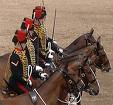William Haycock 1816 - 1877
September 02, 2009
 William
Haycock 1816? - 1877?
MRCVS,
Edinburgh Veterinary College
1842,
member
of the Lancashire Veterinary Medical Association, was an orthodox
practitoner who converted to homeopathy in
1850.
William
Haycock 1816? - 1877?
MRCVS,
Edinburgh Veterinary College
1842,
member
of the Lancashire Veterinary Medical Association, was an orthodox
practitoner who converted to homeopathy in
1850.
In 1852, William Haycock advocated veterinary homeopathy as a protest against the violent practices of bleeding and purging,
William Haycock was employed by Edward Charles Warde, who entrusted William Haycock with the complete homeopathic management of all of the horses belonging to C Troupe, Royal Horse Artillery at the Leeds Barracks.
William Haycock was a colleague of William C Lord,
William Haycock practiced at 3 Moreton Street, Strangeways, Manchester, and at the Veterinary Institution, West Parade Huddersfield,
The Lung Disease of Cattle; or pleuro pneumonia cured by homeopathy, Henry Turner 1856 discussed some work done by William Haycock, who first noticed this disease in 1842, George Edward Allshorn, Charles W Luther and John Rush, who also had experience treating this disease.
Farmers had been losing thousands of cattle to this disease, Charles W Luther estimated that 6 out of every 10 cattle so affected could be cured. Peter Stuart also was using homeopathy at this time and treated up to 180 cows with this disease, saving about 130 of them. George Edward Allshorn used aconite and bryonia and estimated he had saved 17 out of every 20 cows he treated.
In 1851, Edward Charles Warde consulted William Haycock, a homeopathic vet in Huddersfield, to attend one of his horses which, recovering from influenza, was now suffering from difficulty in breathing. William Haycock treated the horse with arsenicum and sulphur and the horse recovered.
Shortly thereafter, William Haycock was entrusted with the complete homeopathic management of all of the horses belonging to C Troupe, Royal Horse Artillery at the Leeds Barracks.
Edward Charles Warde provided William Haycock with the following testimonial ( Anon, The American Journal of Homoeopathy, Volumes 7-9, (C. G. Dean, 1852). Page 44):
“There were some acute and very dangerous cases, others of chronic character, and I have no hesitation in testifying to the perfect and complete success of your treatment under both circumstances.
“I have amply tested this system in my own stables for many years, and am perfectly satisfied of its vast superiority over the old mode of veterinary treatment in every way.
“You are at liberty to make any use you may think proper of this, and, I am, your sincere well wisher. Edward Charles Warde Captain, Royal Horse Artillery, Woolwich, May 18th 1853.”
In 1858, though allowing itself a good dig at homeopathy, the British and foreign medico-chirurgical review: Volume 22, nonetheless gave a good review of William Haycock’s _Treatise on the principles and practice of veterinary medicine & surgery_,
William Haycock wrote Elements of veterinary homoeopathy, Treatise on the principles and practice of veterinary medicine & surgery, and several other books on veterinary practice. He also submitted cases and articles to various homeopathic and veterinary publications.
Of interest:
Captain Haycock was a supporter of homeopathy in 1882.